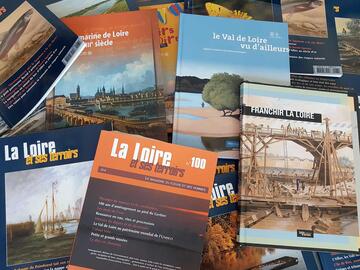
06/03/2025
[Fr] Décès de Philippe Auclerc
C'est avec tristesse que nous avons appris aujourd'hui le décès de Philippe Auclerc, co-fondateur de la maison d'édition "Loire et terroirs" et rédacteur...
Published on 26 October 2015 - Updated 05 November 2015
Cet article date d'il y a plus de 9 ans
Added to the World Heritage List in 2011, the coffee cultural landscape of Colombia is an exceptional example of a sustainable and productive cultural landscape which is unique and representative of a tradition that is a strong symbol for coffee growing areas worldwide. In October 2015, Sonia Uribe, a specialist researcher, came to work at Mission Val de Loire for a week.
In 2000, UNESCO included the Loire Valley in the World Heritage of Humanity List, which reflects the wealth and diversity of the Earth’s cultural and natural heritage. Each month in 2015, Mission Val de Loire is presenting a different site to you which, as well as being a world heritage, is also part of our heritage.
It reflects a centennial tradition of coffee growing in small plots in the high forest and the way farmers have adapted cultivation to difficult mountain conditions. The urban areas, mainly situated on the relatively flat tops of hills above sloping coffee fields, are characterised by the architecture of the Antioquian colonisation with Spanish influence.
The landscape encompasses six farming sites, which include 18 urban centres on the foothills of the western and central ranges of the Cordillera de los Andes in the west of the country.
Sonia Uribe is a Regional Planning Researcher at Sorbonne Nouvelle University, committed to the integration of practical management skills into political systems for local development. Her research focuses on the relationship between sustainable development and cultural landscapes associated with world heritage sites.
This placement takes place within the framework of the French-speaking international centre for training and discussions among heritage site operators ( Pôle international francophone de formation et d’échanges des gestionnaires de sites patrimoniaux ), which is administered by the Grands Sites de France Network under the patronage of UNESCO. The purpose was for the two participating projects, the Coffee Cultural Landscape of Colombia and Mission Val de Loire, to share experiences and knowledge. Key subjects under discussion were management issues, in particular those relating to sustainable development, heritage, visitors, local development and preservation.
Both the Loire Valley in France and the Coffee Cultural Landscape of Colombia (CCLC) are well known for their extraordinary natural and cultural landscapes, and present us with both challenges and opportunities to be learned from. The work to preserve agricultural and natural spaces around the heritage sites is important for local development. Sustainable Development is a crucial tool we can use to manage our world heritage sites.
This opportunity inspired me to seek out partnership opportunities between Mission Val de Loire and CCLC. The lessons learned from comparing our work on these different projects could help us to improve the way we implement sustainable development for both sites. The Mission Val de Loire interregional association is one example of a management structure in the Loire Valley, and its experience could be shared for the benefit of the CCLC. In addition, the use of the Colombian experience managing the “Coffee Routes” as a model for local development could empower both the small-scale producers and providers in landscape heritage sites.